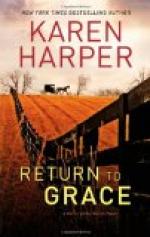“But, dear Magde, you have always—”
“Silence, child,” interrupted Magde, “you do not know the insults to which we females of humble birth are exposed.”
“We are not born that we should thus be insulted,” said Nanna.
“True, true; but then we should have been born as deformed and ugly as those sins, which even our modesty will not preserve us from being suspected of.”
“Can that be possible!” thought Nanna. Magde, who as she spoke had passed her hand upon her forehead, now removed it, and from the expression of her dark eyes, which beamed with her accustomed cheerfulness, and from her proud and lofty bearing, it could be perceived that she had regained her usual self-possession.
“I grieve you, dear Nanna,” said she in a softened tone of voice, “I do not imagine you to be more than a dove which is still fostered within the dovecote. But I was troubled, as I am sometimes, without really knowing the cause.”
“Is there no cause, then?” inquired Nanna.
“I can say that there is or is not a cause, and therefore shall remain silent.”
“Then remain silent, dear Magde, let us speak no further on the subject,” said Nanna quickly, for she was burning with impatience to visit the spring.
She longed to discover by experience whether it was really so dangerous for a woman to walk out alone.
Until the day before, it had not been dangerous, for no one had forbidden her the free enjoyment of God’s beautiful earth, and neither had her modesty ever been insulted. On any other occasion, Nanna would have been influenced not only by curiosity, but by a far purer feeling, namely, sympathy for Magde’s sorrows,—for she dearly loved her sister-in-law,—and would have asked an explanation of matters which she at present was anxious to avoid.
Magde was silent.
Nanna stepped over the door sill.
But stern fate compelled her to turn back a second time, for the moment that Magde turned to pass into the house, old Mr. Lonner advanced to the door.
“Nanna my child,” said he, “bring my chair out into the door-yard. The evening air is so cool and pleasant that it will invigorate my old body; but it would be better I think, if my rheumatism will permit it, to take a little stroll in the fields, with the aid of my walking cane on one side, and with you as a staff to support me on the other.”
Nanna blushed so deeply that she felt the blood burning her cheeks, as she advanced the opinion that the exercise might prove injurious to him.
“Poor child, you are grieved on account of your old father. I will take your advice. Bring my arm-chair out, and we will sit here and have a little chat together.”
Hitherto, when her father had chatted to her of all that he had seen and experienced, Nanna had considered herself amply rewarded for her days of labor, but on this occasion, she not only went after the chair reluctantly, but also, when she as usual seated herself with her knitting work on her little bench at his side she sighed deeply. Her father did not observe her dejection, perhaps he considered it an impossibility for his precious jewel to sigh when she was with him.




